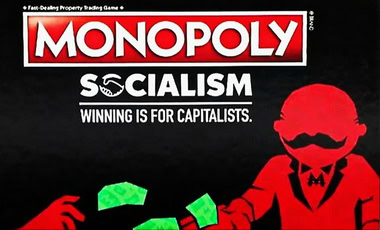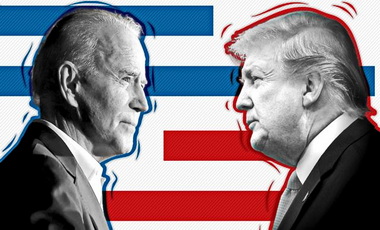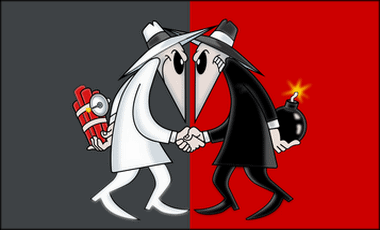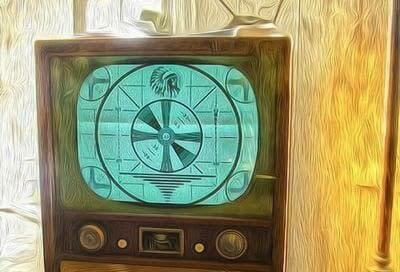I just will drop this here that the #1 the Foundation for Economic Education (FEE) recommends from their top five books is:
1. Economics in One Lesson (Henry Hazlitt, 1946)
The fact that I recently dedicated an article to this masterpiece shows the special attachment I have to Henry Hazlitt and this work in particular. In Economics in One Lesson, the author debunks a series of widespread economic fallacies using a simple and accessible language. If you wish to learn more about some basic, though important, economic principles, this is your book. One piece of advice before starting to read it: get rid of your prejudices and preconceptions so that you can make the most of it.
Stossel
John Stossel investigates a New York City park bathroom that cost $2 million to build. (This video was made 7-years ago… factor in inflation [printing money].)
- For that price you might expect gold-plated fixtures—but it’s just a tiny building with four toilets and two sinks. New York City Parks Commissioner Mitchell Silver says $2 million was a good deal because “New York City is the most expensive place to build.” He estimates that future bathrooms will cost more than $3 million. Commissioner Silver argues that this park, on the outskirts of Brooklyn, will get so much use that it must be built to last, and that can be expensive. Yet privately managed Bryant Park, in the middle of Manhattan, gets much more use and its recent bathroom renovation cost just $271,000. Since government spends other people’s money, it doesn’t need to worry about cost or speed. Every decision is bogged down by time-wasting “public engagement,” inflated union wages, and productivity-killing work rules. Two million dollars for a bathroom. That’s your government at work.
Prager-U
Few people have had as profound an impact on modern economics as economist Milton Friedman. His Nobel Prize-winning ideas on free enterprise resonated throughout the world and continue to do so. Johan Norberg, Senior Fellow at the Cato Institute, tells Friedman’s fascinating story.
O.G. No Free Lunch
Milton Friedman gives his thoughts on something called the “free lunch myth”. The idea is that the government can provide stuff for free at nobodies expense. Milton Friedman thinks this is false and he tells us why. Share with Bernie Sanders supporters you know.
NATIONAL REVIEW has a wonderful series on the issue. Longer videos, but well worth your time”
Father Robert Sirico | No Free Lunch with David Bahnsen
David L. Bahnsen and Father Sirico discuss the philosophical and theological foundations of American free enterprise. Father Robert Sirico is a Priest, Author, and the Cofounder and President of the Acton Institute.
Dr. Hunter Baker | No Free Lunch with David Bahnsen
In Episode 2, David and guest Dr. Hunter Baker define human action, defend the dignity of work, and dissect the dangers of collectivism. Hunter Baker, J.D., Ph.D. serves as dean of arts and sciences and professor of political science at Union University in Jackson, Tennessee.
Dennis Prager | No Free Lunch with David Bahnsen
David speaks with guest Dennis Prager, author, host of The Dennis Prager Show and founder of PragerU, about the many ways covetousness and class envy corrode good economics, the nature of inequality, and how the Left’s culture of entitlement destroys the American value system.
Larry Kudlow | No Free Lunch with David Bahnsen
Bahnsen speaks with Larry Kudlow, former director of the National Economic Council and host of Kudlow on Fox Business, about why incentives are the heart of economics. The two discuss the history of supply-side economics, discuss the regulatory policies and problems that disincentivize businesses and households, and address the disease of wokeness in American boardrooms.
Ryan T. Anderson | No Free Lunch with David Bahnsen
Thanks to the Left’s culture of class envy, private property has become a four-letter word in popular culture. In this episode of No Free Lunch, Ryan Anderson, author and president of the Ethics and Public Policy Center, joins host David Bahnsen to examine the theological justification for accumulating private property, discuss how private property creates prosperity and encourages compassion, and debate the State’s role in private-property protection.
Doug Wilson | No Free Lunch with David Bahnsen
David hosts Pastor Doug Wilson to discuss virtue and discipline not simply as desirable moral characteristics in economics, but as the very necessity of free markets.
(BONUS EP.) Sen. Ted Cruz | No Free Lunch with David Bahnsen
David Bahnsen speaks with guest Senator Ted Cruz about the government’s role in free markets and the conservative vision for sound economic policy.
However, the PHRASE “There ain’t no such thing as free lunch,” is made into an acronym (TANSTAAFL). And it is used to great delight in various and sundry ways: here, here, here, here, here, and here, as some examples. It’s origin dates back quite some time. But QUOTE ORIGIN did some bang up work on the matter. LIBERTARIANISM.ORG has the intro to the fable:
“There ain’t no such thing as a free lunch” has been a popular libertarian slogan since the 1960s. The slogan’s meaning is simple: you cannot make something from nothing. In a political context, the state cannot promise fantastical benefits without eventually increasing taxes.
Although Robert Heinlein is responsible for popularizing the slogan, he is not its creator. The phrase might seem a little alien because it is associated with an old business practice that diminished over time following the Great Depression. Between 1870 and 1920, bars and taverns served free lunches with the purchase of a drink to entice new customers. Salty food was served to get customers to drink more beer and spend more money.
The first use of TANSTAAFL in its modern context can be found in an article entitled “Economics in Eight Words” in the El Paso Herald-Post from 1938, likely written by a man named Walter Morrow, editor-in-chief of The Southwestern Group of Scripps-Howard Newspapers.
“Economics in Eight Words”
Once upon a time a great and wise king ruled a populous and prosperous land. The width and breadth of his kingdom were measured in thousands of leagues.
But a plague of poverty came upon that land, and no man knew its cause. There were mighty and inconclusive arguments in the halls of government, and learned graybeards in the schools advocated this remedy or that.
The king, seeing that his people were starving and distressed in the midst of plenty, called his wisest counsellors from the four quarters of the kingdom.
Seated on his golden throne and arrayed in his royal robes, he commanded them to lend him their wisdom. Then began an argument that lasted all through the night, until the King’s head drooped wearily with the weight of the sapphires and diamonds in his golden crown. As dawn was breaking he arose and said:
“Here is only confusion of tongues. I have heard many of you speak of a science called economics, which may prove the key to my people’s troubles.
“Mark well my words: One month hence let all the economists of my kingdom assemble here, bringing with them a short and simple text on this subject of economics, so that I may find light and my people may be saved.”
A month passed. The economists assembled, and their number was two thousand and ten.
“Where is my short text on economics?” asked the king.
“O, sire,” replied the chief economist, “we have it not. To prepare such a text will require at least a year.”
“That,” said the king, “is a long time, and my people languish. But go, now, and get to work without delay.” A twelvemonth later the economists took their places in the great audience hall, around the crystal walls of which stood the palace guards, armed with spears and crossbows. Then stood forth the gray-bearded chief economist.
“O, King,” he said, “We have labored with all diligence and have prepared the short text on economics for which you asked. We have it here in 87 volumes of 600 pages each, profusely illustrated with charts and graphs.”
The king, exceedingly wroth, raised his scepter and let it fall with a crash, so that the great sapphire in its tip bit deeply into the table top before him. And the guards, raising their crossbows, shot one thousand and five of the economists.
“Now,” thundered the king, “get you gone, and return not until you have written me a really brief text on economics.”
And the remaining economists fled down the long hall, and the iron doors of the palace clanged behind them.
But, another year having passed, they returned, and the aged spokesman spoke with prideful voice:
“Sire, at last we have just what you want. We have reduced our work on economics to 63 volumes by eliminating the graphs and charts.”
Again the king raised his scepter and brought it down, with such force this time that the great sapphire remained embedded in the walnut and the pearl of the table top. Again the guards shot their crossbows, and again the number of economists was reduced by half. And those left alive fled once more from the king’s wrath.
Year after year they returned to the palace, bringing each time a slightly more condensed version of the text on economics. But never was the king satisfied, and each time the palace guards shot more economists until at last only one remained alive.
He was a man of profound wisdom, but aged and feeble, so that never had he been able to make his voice heard above the disputations of his colleagues.
And a day came when this last economist plodded slowly to the palace and sought audience with the king, himself now a graybeard, sad and bent with pondering the troubles of his people. Trembling, the last economist approached the throne, prostrated himself before the king, and spoke:
“Your majesty, I have reduced the subject of economics to a single sentence, so brief and so easily remembered that it was not necessary to put it on paper. Yet I will wager my head that you will find my text a true one, and not to be disputed.”
“Speak on,” cried the king, and the palace guards leveled their crossbows. But the old economist rose fearlessly to his feet, stood face to face with the king and said:
“Sire, in eight words I will reveal to you all the wisdom that I have distilled through all these years from all the writings of all the economists who once practiced their science in your kingdom. Here is my text:
“There ain’t no such thing as free lunch.”
This also comes by way of LIBERTARIAMS.ORG’S YOUTUBE CHANNEL via CATO! Good stuff.
There’s No Such Thing as a Free Lunch (Milton Friedman) – The Turney Collection
- Milton Friedman, recipient of the 1976 Nobel Prize for Economic Science, was one of the most recognizable and influential proponents of liberty and markets in the 20th century, and the leader of the Chicago School of economics. In this video from the grand opening of the Cato Institute’s headquarters in Washington, D.C. in 1993, Milton Friedman gives a talk about popular political aphorisms, one of his favorites being the one he helped popularize in the title of his 1975 book, “There’s no such thing as a free lunch.”






